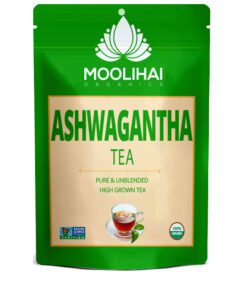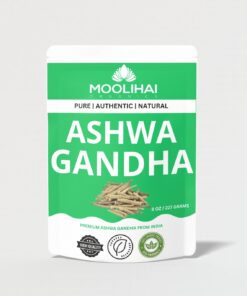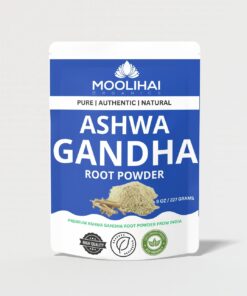Info
9 Science-based Health Benefits of Ashwagandha Tea

Ashwagandha tea is an Indian beverage that has started ruling the world market due to its antidepressant, immune-boosting, and anti-carcinogenic activities.
After all these years, Herbal teas have started getting appreciation for their health benefits in the world market. The practice of boosting immunity power and maintaining energy levels to fight off infections by including herbal ingredients or supplements in the diet has increased in the past few years of the viral season.
Though there are numerous herbal teas available right now, just a few of them include adaptogens. Ashwagandha tea is one among the few. Ashwagandha tea may not be as popular as Natural Green Tea or Tulsi Tea, but it is equally beneficial. Let’s look into the proven health benefits of ashwagandha tea, its nutritional profile, and consumption.
What is Ashwagandha?
Ashwagandha is an important herb used in the Indian medicine system for boosting energy and natural healing. In Ayurveda, ashwagandha root and powder have been used for thousands of years to improve immunity, reduce stress, and enhance focus and concentration.
Read also: Best Ashwagandha Supplements for Immunity and Stress-relief
Ashwagandha is botanically called Withania somnifera, which is a small shrub native to India and cultivated in Southeast Asian countries Nepal, China, and Yemen.
Facts about the names
Ashwagandha is a Sanskrit word meaning “smell of the horse” that refers to the scent of herb and its potency to increase strength. Also, the botanical name, Withania somnifera, is a Latin word meaning “sleep inducer”. So does the root highly used to strengthen the body and soothe the mind.
Ashwagandha is often identified by its dull green leaves, bright yellow bell-shaped flowers, and orange-red fruits like rosehips. The root and leaf extract or powder are used to cure a range of health conditions.
The other common names of Ashwagandha are winter cherry and Indian ginseng.
The Ashwagandha tea prepared from the dry roots of the plant might be a great alternative to caffeine in the morning to boost energy and in the evening to destress the mind.
Nutritional Profile of Ashwagandha
Ashwagandha has immunity-boosting, anti-aging, antibacterial, anti-inflammatory, anti-carcinogenic, and de-stressing properties.
It balances our body functioning by promoting overall immunity, strength, energy, and endurance. Ashwagandha is famed for having fertility-boosting activities.
The herbal tea helps to deal with daily stress, fight depression, anxiety, and brain functioning.
9 Proven Health Benefits of Ashwagandha Tea
Ashwagandha is a popular Ayurveda medicine and alternative treatment. But, there is no scientific evidence to approve the health benefits of ashwagandha tea and root.
Indian and other traditional alternative medicine systems have been focused on using ashwagandha root as tea and herbal supplements. The ashwagandha roots as dried herbs or powder are available in local shops and online stores.
Though we need more convincing research on the actual health benefits of ashwagandha herb and tea, we can’t disbelieve the benefits after seeing its role in Ayurveda medicine for more than 2000 years.
So, we created a list of Health benefits of Ashwagandha tea based on some of the available research for you to clarify.
1. Reduce Blood Sugar
Research shows that ashwagandha herbal tea may help in lowering the sugar levels in the blood. A lab study published in Phytochemistry proved that ashwagandha root aided in the uptake of glucose levels and insulin sensitivity which are beneficial for diabetic patients.
Another human study done by Indian and Vermont researchers showed that ashwagandha helped to increase glucose uptake in hundreds of volunteers more than sugar pills after 60 days of monitoring.
A study published in the Indian Journal of Experimental Biology proved that ashwagandha was supported by reducing blood sugar levels equal to an oral hypoglycemic drug.
However, the studies are small so we need larger human studies to confirm the effects of ashwagandha on diabetes.
2. Cancer Treatment
A few small studies that tested ashwagandha roots have proved that the herb may help in cancer treatment and prevent cancer cell growth. But there are no studies that tested ashwagandha as a stand-alone treatment.
A study published in the AAPS Journal showed that the presence of the crystalline steroidal compounds in the ashwagandha leaves possess anticancer properties.
An animal study found that withaferin A compound in ashwagandha may protect against chemical-induced cancers in rodents.
Another animal study published in PLoS One Journal found that withaferin A compound can be effective against chemo-resistant cancer stem cells in mice. The research concluded that withaferin A with cisplatin showed a reduction of ovarian cancer cells. This combination of compounds was found to be naturally effective to kill stem cells.
Most of the anti-cancer studies of ashwagandha were done on animal models which may not be completely possible for human cancer treatment.
3. Stress Relief
The most important use of Ashwagandha is for stress relief. Its botanical name derived from a Latin word proved this fact. However, some research showed that ashwagandha roots and leaves may aid to reduce cortisol levels which is a human stress hormone.
So if you are suffering from stress-related hair loss, ashwagandha could take you out of it.
Read also: Benefits of Ashwagandha for Hair
It also helps to control stress mediators including Hsp70, cortisol, and JNK-1 proteins. HPA, otherwise called the hypothalamic-pituitary-adrenal axis, is a system in the body that is responsible for regulating stress responses. Ashwagandha may help to reduce the activity of this system.
A human study examined the effect of the ashwagandha herb’s de-stress properties. It included 98 human models who suffered from chronic stress. A part of the models was consumed ashwagandha and another part consumed placebo for 60 days. The result showed that consumption of ashwagandha in individuals made a significant reduction in cortisol levels.
Another study published in the Indian Journal of Psychological Medicine found that ashwagandha and its extract reduce stress and anxiety. The double-blind trial was conducted on 64 individuals who received 300 mg of ashwagandha root extract or a placebo (a sugar pill). The research found a significant reduction in stress levels and lower serum cortisol levels in individuals who consumed ashwagandha powder. Moreover, the researchers believe the ashwagandha roots influence the nervous system and alleviate anxiety disorders.
4. Boost Fertility
Some study analyses and research show that ashwagandha may boost fertility in men and women. In fact, in some alternate medicine, ashwagandha root powder has been used to treat infertility in men.
A published study from Fertility and Sterility evidenced an impact of ashwagandha in boosting fertility. The specific study is conducted in India with 75 healthy fertile men and 75 men who were under fertility screening. The use of ashwagandha powder increases sperm count and sperm quality. The study found that ashwagandha helped to lower oxidative stress and improve the quality of good testosterone levels.
Read more: Health benefits of Ashwagandha for men
The researchers concluded the result with the statement that ashwagandha may help to increase thyroid hormone levels which results in better fertility.
5. Reduce Inflammation
Herbal teas are high in anti-inflammatory properties. So does the Ashwagandha tea. The anti-inflammatory activities reduce inflammation internally and externally that protect overall health.
Inflammation is the reaction of our body to foreign substances but when it happens in serious parts of the body it will cause severe health conditions. Chronic inflammations may let you face cardiovascular diseases.
Anti-inflammatory properties have been found to relax blood vessels naturally. As a result, blood pressure and cholesterol levels are reduced which otherwise causes health problems. The inflammation increases the rate of white blood cells which are important for a better immune system.
Ashwagandha helps in reducing inflammation in the brain and supports healthy brain function too. It may be useful in the treatment of dementia. Brain problems like Parkinson’s, Alzheimer’s, Huntington’s, and bipolar disorders can be prevented using ashwagandha. The anti-inflammatories in ashwagandha also treat hyperpigmentation, acne scars, dark spots, under-eye blackness, and many other skin problems.
Related: Benefits of Ashwagandha for Skin
6. Sound Sleep
Withania somnifera, the botanical name of ashwagandha means ‘sleep inducer’. Studies found that ashwagandha may promote sound sleep while promoting energy and endurance.
Some research showed that intake of 300 mg of ashwagandha powder twice a day for two months may treat insomnia and provide sound sleep.
Ashwagandha powder is often used to prepare nighttime lattes for better sleep. The root powder is blended with other spices like cardamom and milk. To make a simple ashwagandha latte, mix a tsp of ashwagandha powder with a cup of hot milk. Let it cool for a minute and add a spoon of honey.
You can make this with different added ingredients like cinnamon, vanilla, cocoa, and so on. You can replace the regular milk with non-dairy milk like almond, coconut, or others.
7. Athletic Performance
Ashwagandha is known for its boosting properties that increase energy, endurance, and strength of the body.
The research found that ashwagandha may be a great supplement for athletes to improve their performance.
A research analysis included 12 studies in men and women who consumed ashwagandha in a dose of 120 mg to 1250 mg in a day. The researchers believe that herbal intake may boost physical performance.
After analyzing five studies based on the above fact, the result showed that taking ashwagandha powder prominently increased oxygen consumption (VO2 max) in healthy adults.
VO2 measures the fitness of the heart and lung. It is the amount of maximum oxygen a person can use during activity. The optimal VO2 max is important for everyone, especially athletes. The lower VO2 max may be linked to the risks of heart problems.
Another 8 weeks study was conducted on a group of men by giving them 600 mg of ashwagandha powder daily. The individuals participated in resistance training throughout the study and showed a positive gain in muscle strength and muscle size than a group who took a placebo.
8. Improve Cognitive Functions
Taking ashwagandha powder may help with cognitive functions.
An analysis of five studies found that ashwagandha could have improved cognitive functions in certain people, including individuals with mild cognitive impairment and schizophrenia.
Possibly improved cognitive functions by taking ashwagandha are,
- attention
- executive time
- performance on brain tasks
- reaction time
- information processing time
A study on 50 adults that tested them with the intake of 600 mg of ashwagandha extract daily for 8 weeks showed notifying improvements in general memory, attention, and data processing speed than a group who took a placebo.
The compounds including WA and antioxidants in ashwagandha induce an effect in the brain and benefit improved cognitive functions.
9. Safe and Available
Ashwagandha is a relatively safe and widely available herb. It can be used as a herbal supplement.
The analysis of 70 studies found that ashwagandha root powder and extract are safe and benefit a few health conditions including insomnia, stress, anxiety, depression, and improved body endurance.
A study held on 80 men and women found that consuming 600 mg of ashwagandha powder daily for 8 weeks did not show any adverse effects on the health of participants.
How to prepare Ashwagandha Tea
Ashwagandha tea can be prepared from either dried or fresh root or dried root powder or using a readymade teabag. The powder will give more intensity and original flavor to the drink. But you can blend it with other herbs or spices to taste better.
While using dried ashwagandha root, pick small broken pieces. You can buy dried roots and grind them into powder as needed.
WAY 1: To prepare an ashwagandha tea using dried roots or dried root powder,
- Take one and a half cups of water and boil it to one cup.
- Add a few dried ashwagandha roots or one teaspoon of root powder.
- Let it infuse (powder) or simmer for 15 minutes (roots).
- Add additional spices of your choice like cardamom, ginger, cinnamon, or others (optional).
- Strain it in the cup.
- Add lemon juice or honey to improve flavor.
WAY 2: To prepare an ashwagandha tea using tea powder,
- Take a cup of hot water.
- Add a teabag or a teaspoon of tea powder.
- Add additional spices of your choice (optional).
- Let it infuse for 5 minutes.
- Remove the teabag or filter tea powder.
- Add lemon juice or honey to improve flavor.
Many medicinal journals have shown that Ashwagandha tea helps to promote relaxation and sleep. You can enjoy a cup of Ashwagandha tea after a breathtaking day to alleviate stress and tiredness in the body and mind.
Flavor Profile of Ashwagandha Tea
As plant root is used for making tea, Ashwagandha herbal tea is bitter and earthy. The aroma is often linked with a horse that justifies its name. The pungent aroma might be a reason why most people consume the root in the form of supplements and powder rather than an infused tea. But, ashwagandha blended with other ayurvedic medicinal herbs may reduce the bitterness a little. Ashwagandha is often blended with cloves, ginger, cardamom, and a spoon of honey for a better aftertaste.
Side Effects of Ashwagandha
Ashwagandha tea is relatively safe for most people.
Still, there are possible risks of taking this for certain populations, for example, pregnant women and lactating mothers. A high dose may cause miscarriage. Also, there are not enough studies to prove the safety of ashwagandha on them. So it is best to avoid or else contact a professional.
Those who have hormone-sensitive prostate cancer and those who are under medication for any chronic diseases should avoid taking ashwagandha.
Some possible risks of taking ashwagandha in high doses are diarrhea, drowsiness, and gastrointestinal discomfort.
If you have thyroid disease, you should consult a doctor before taking ashwagandha as it may affect thyroid hormones.
If you are taking medication for immune diseases such as rheumatoid arthritis or lupus, you should not take ashwagandha. As this herb has immune-boosting properties it may increase the activities of the immune system which worsens the conditions of autoimmune diseases. Make a call to your professional healthcare provider before taking herbal teas when you are under medications.
What is the right dose?
The serving dose of ashwagandha and its products is variable. It is safe to consult a healthcare professional to clarify the correct dosage to your body requirements.
Not only does ashwagandha but all the herbal medicine and supplements take time to show effects, so remember, you have to take it for several months with medical supervision to see the effective results.
Obtaining the health benefits of Ashwagandha tea is easy as it can be taken any time of the day with or without meals or an empty stomach. You can take it once or twice a day. Contact a doctor if you have doubts regarding the dose and timing of using ashwagandha.
Bottom Line
Ashwagandha root and leaves are an ancient alternate medicine that has been used for various health conditions.
Studies conducted on the herb suggest that the health benefits of ashwagandha tea are high for brain functions and the nerve system. In Ayurveda, ashwagandha is used as Rasayana which means rejuvenator. It helps to reduce stress, depression, anxiety, insomnia and improves cognitive functions.
Always talk to the professionals before adding herbal teas and supplements to your daily diet to avoid possible risks.





Ponnatharam Stone (Raw) | For Permanent Hair Removal
Vengai Paal | Black Bindi | Dhrishti Pottu | Vengai Pottu for Babies | 100% Natural
Original Edible Camphor | Pacha Karpooram | Bhimseni Camphor
Dried Avaram Senna Flower / Cassia Senna Auriculata / Aavaram Poo / Tarwar / Amaltas Leaves / Senna Auriculata / Avaram Poo / Sanay / Alexandrina / Tanner’s Cassia flower
Natural Dried Moringa Flower – Moringa Oleifera – Drumstick Tree Flower – Murungai Poo – Munagaku Flower
Akasa Garudan Kilangu / Redfruit Creeper / Corallocarpus Epigaeus
Pure Ponnatharam Powder For Hair Removal
Insulin Leaf Powder / Chamaecostus Cuspidatus / Costus Pictus / Spiral Ginger / Insulin Powder / Costus Igneus
Saussurea Obvallata Seeds / Brahmakamal Seeds / Queen of the night / Sacred Saussurea Kon Kapfu / Brahma Kamalam / Nishagandha
Achu Pottu for Babies | Bindi Mould Set | Baby Seratta – 1 Set
Kaunch Beej Powder |Poonaikali | Velvet Bean Powder | Mucuna Pruriens | Kapikacchu | Natural Nervine Tonic & Muscle Builder
Aalam Pazham / Banyan Fruit Powder / Ficus Benghalensis / Marri Palu / Bargad / Dodda Alada Mara / Peraal / Vat Vriksha Powder